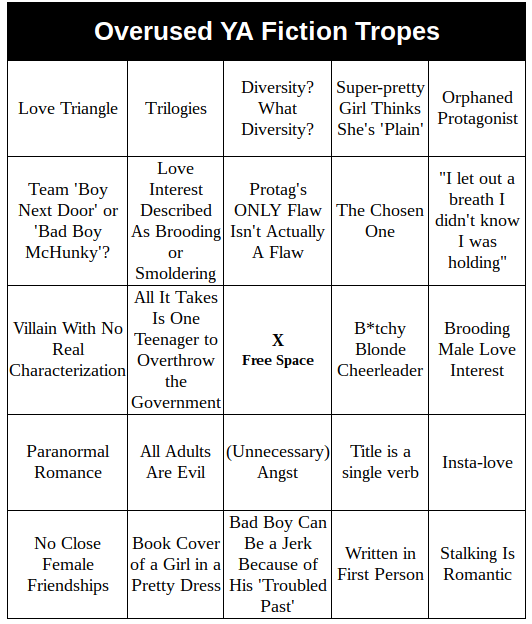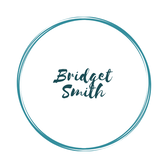|
I don't write young adult books (yet!), but the above bingo board made me laugh because of the hints of truth which shine through. These common patterns in media (movies, TV shows, books, etc.) are known as tropes, and are more commonly known as cliches. Looking at the bingo board above, I can think of half a dozen YA books which check off several of these boxes (Twilight, anyone?). However, despite the constant advice writers get to avoid tropes, they can be useful. For the reader, tropes help us figure out what types of books we like and dislike. For example, maybe you're not looking for a book like Game of Thrones, where everybody is both good and evil, you prefer the more traditional battle of the Big Bad and the Ultimate Good. That's not a bad thing at all, it just means the author has to be creative about finding a way to deliver the trope where readers are still interested, and can't simply predict the outcome of the book twenty pages in. There are dozens of excellent articles outlining tropes in fantasy (one of my favorites is here). This is not that kind of blog post. Instead, my goal is to share some strategies to using tropes effectively in your writing, to keep the reader guessing. Good vs. EvilOne of the most common fantasy tropes there is focuses on the battle between good and evil. The trope assumes a lot, including:
This trope plays out over and over, perhaps most famously in Harry Potter and The Lord of the Rings. It's a comforting trope, because it reminds us that good triumphs over evil, and that strength can be found in the unlikeliest of places (like among hobbits who have never left the Shire before). The opposite end of this trope is what we get in series like Game of Thrones and The Witcher, where the world is a cruel, cold place and the people living in it are aggressively realist. These stories often have the following characteristics:
It all comes down to subverting expectations.You have to be clear up front with yourself: which parts of the trope get to stay, and which are getting voted off the island. For example, let's say you decide you're writing a story where ultimately, good triumphs over evil. It's unambiguous: any reader can tell you who the Good Guys and Big Bad are within the first 100 pages. But, you don't want it to just be another hero's journey either - you want to do a new take on an old concept.
The good news for you? Tropes tell you exactly what your reader will expect. You know that, the entire book (or series), your readers are waiting for the Hero to defeat the Big Bad. What can you do with that information? How can you twist the story just enough to keep your audience guessing?
Comments are closed.
|
AuthorBridget is the author of Summer Twilight, available for purchase now! Categories
All
Archives
March 2021
|

